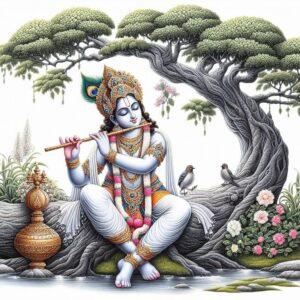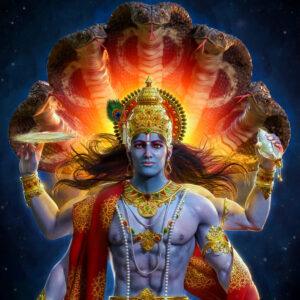Hinduism, a religion steeped in tradition and rich in symbolism, boasts a diverse pantheon of deities. This guide explores some of the most prominent Hindu gods and goddesses, delving into their stories, significance, and roles within Hindu culture and rituals. Understanding these deities allows individuals to connect more deeply with their heritage and spiritual practices. Poojn.in, India’s largest online store for cultural goods and services, offers a wide selection of products to enhance your worship experience. Explore our collection and discover authentic idols, puja items, and more.
Understanding the Hindu Pantheon
The vast array of Hindu deities can be initially overwhelming. This overview provides a framework for understanding the classification of gods and goddesses within Hinduism:
- Trimurti: The core of the Hindu pantheon is the Trimurti, consisting of Brahma (the creator), Vishnu (the preserver), and Shiva (the destroyer). These three deities represent the fundamental forces governing the universe: creation, sustenance, and transformation.
- Devi or Divine Feminine: The feminine aspect of divinity is represented by goddesses like Saraswati (knowledge and arts), Lakshmi (wealth and prosperity), and Parvati (power and devotion). These goddesses embody various forms of energy and power, essential for universal balance.
- Avatars: Particularly associated with Vishnu, avatars are incarnations of a deity that descend to Earth to restore dharma (righteousness). Notable avatars include Rama and Krishna, central figures in Hindu epics.
- Other Important Deities: Beyond the Trimurti and primary goddesses, other important deities include Ganesha (remover of obstacles) and Hanuman (devotion and strength). These deities are widely revered and play significant roles in Hindu mythology.
- Regional Variations: The prominence of specific deities can vary across different regions of India. Certain deities may be more widely worshipped in particular areas due to local traditions and beliefs.
- Ishta Devata: Hinduism embraces the concept of Ishta Devata, allowing individuals to choose a personal deity for worship based on their affinity and connection.
- Symbolism: Hindu deities are often depicted with multiple arms, specific vehicles (vahanas), and symbolic objects representing their powers and attributes. These symbols enrich the understanding of each deity’s significance.
Major Hindu Gods
Let’s explore some of the most revered male deities in Hinduism:
- Brahma: The creator god, responsible for bringing the universe into existence. While less commonly worshipped than Vishnu or Shiva, Brahma remains a crucial figure in Hindu cosmology.
- Vishnu: The preserver god, maintaining cosmic balance and order. Vishnu is known for his ten avatars (Dashavatara), each descending to Earth for a specific purpose. Find exquisite Vishnu idols and puja items at poojn.in.
- Shiva: The destroyer god, representing transformation and the cycle of life, death, and rebirth. Shiva is revered in various forms, including Nataraja (lord of dance) and Mahadeva (great god). Enhance your Shiva worship with authentic rudraksha malas and puja sets from poojn.in.
- Ganesha: The elephant-headed god, widely worshipped for removing obstacles and ensuring success in new endeavors. Ganesha is beloved for his wisdom and benevolent nature.
- Hanuman: The monkey god, epitomizing devotion, strength, and unwavering loyalty. Hanuman’s role in the epic Ramayana highlights his significance as a symbol of selfless service.
Major Hindu Goddesses
Hinduism also venerates powerful goddesses embodying the divine feminine energy:
- Saraswati: The goddess of knowledge, music, and the arts. Saraswati is often depicted with a veena (a stringed instrument) and a lotus flower, symbolizing wisdom and purity.
- Lakshmi: The goddess of wealth, prosperity, and abundance. Lakshmi is associated with material and spiritual well-being, often depicted with gold coins and a lotus flower. Celebrate Diwali with Lakshmi puja items from poojn.in.
- Parvati: The consort of Shiva and the mother of Ganesha and Kartikeya. Parvati embodies love, fertility, and devotion, representing the feminine power in the universe.
- Durga: A fierce warrior goddess, symbolizing strength, protection, and the triumph over evil. Durga is often depicted riding a lion and wielding various weapons.
- Kali: A powerful and transformative goddess, representing time, change, and liberation. Kali’s fierce appearance symbolizes the destruction of ignorance and ego.
Conclusion
Exploring the rich tapestry of Hindu gods and goddesses provides a deeper understanding of Hindu culture and spirituality. Each deity offers valuable lessons and connects us to ancient traditions. By honoring these divine beings, we embrace their qualities in our own lives. Whether it’s Saraswati’s wisdom, Lakshmi’s prosperity, or Durga’s strength, their presence offers guidance and blessings. Poojn.in supports your spiritual journey by providing a wide range of authentic puja items and resources. Visit poojn.in today to explore our collection.


